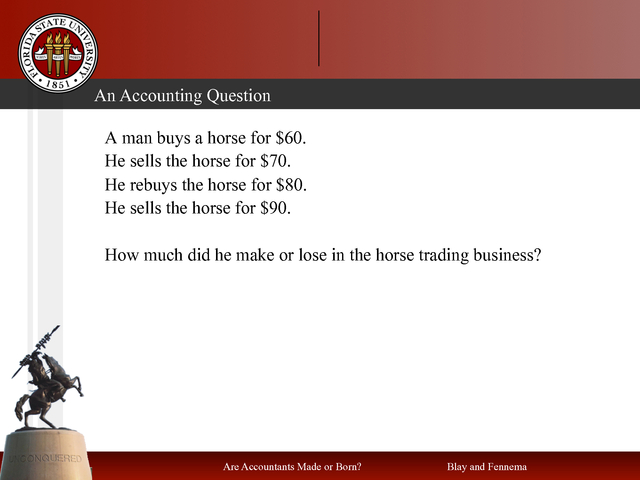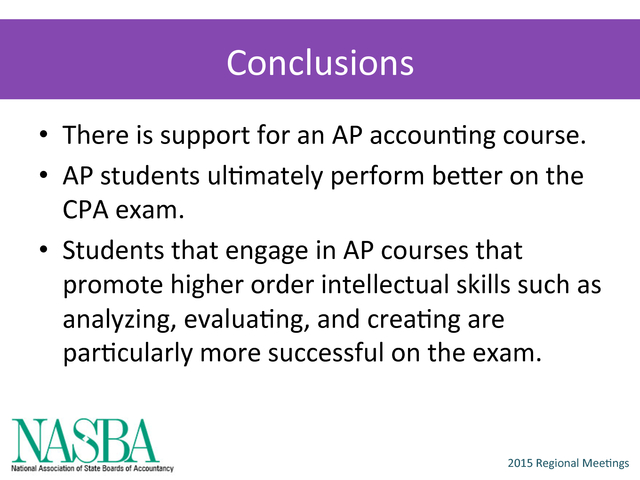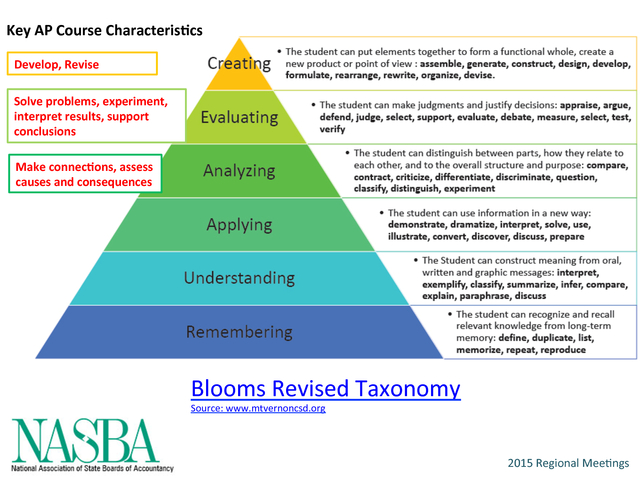Description
NASBA
Accounting
Education
Research
Projects
. Research Grants
Are Accountants Made or Born?
An Analysis of Self-Selection
and Performance in the
Accounting Major and on the
CPA Exam
Dr. Allen Blay, CPA and
Dr. Martin “Bud” Fennema, CPA
. Research Grants
State Policies and Attitudes
Toward Acceptance of Advanced
Placement (AP) Courses and a
Comparison of Success on the
CPA Exam Between Students
That Enter College with
Advanced Placement Credit and
Those That Do Not: A Two Part
Investigation
Dr. Joseph Ugrin, CPA,
Dr. John Morris, CPA
Dr. Dan Deines, CPA
.
Research Grants Intention to Sit For the CPA Exam: An Investigation of Cost, Exam, Support and Career Factors Dr. Martin Coe, CPA . Are Accountants Made or Born? An Analysis of Self-Selection and Performance in the Accounting Major and on the CPA Exam Allen Blay and Bud Fennema . An Accounting Question A man buys a horse for $60. He sells the horse for $70. He rebuys the horse for $80. He sells the horse for $90. How much did he make or lose in the horse trading business? Are Accountants Made or Born? Blay and Fennema . Question 1: Self-Selection Do students self-select into the accounting major based on intrinsic ability to make accounting-related decisions and calculations? NO, they do not – students who said that they were going into accounting were no better than others at the accounting-related decisions. However, many students SAID they selected accounting based on natural ability (38%). Are Accountants Made or Born? Blay and Fennema . Question 2: Performance in the Accounting Major and CPA Exam Does performance on accounting-related decisions and calculations predict success in the accounting major beyond intellectual ability? Success in Accounting Coursework: Yes – Students who answering accounting-related questions well got higher grades in principles of accounting and in their upper-level accounting courses. Success at the CPA EXAM: Yes – For AUD, BEC, and REG. No for FAR. Success in all four parts was highly correlated with a student’s grade in their Principles of Accounting course. Are Accountants Made or Born? Blay and Fennema . Question 3: Can “thinking like an accountant” be taught? Do accounting students show improvement in performance by graduation relative to non-accounting students? Some do. Accounting graduates who were originally in the TOP HALF in performing accounting-related tasks got better. Those in the BOTTOM HALF did not improve any more than a non-accounting major. Are Accountants Made or Born? Blay and Fennema . Conclusions •â€¯ Natural ability to perform accounting-related tasks appears to be highly correlated with success in principles of accounting, other major accounting coursework, and the CPA Exam. •â€¯ However, it is not correlated with self-selection into the accounting major. •â€¯ Further, we find no evidence that students lacking the intrinsic ability to “think like an accountant” can be taught that skill. •â€¯ However, students with an initial intrinsic ability can be trained to be even better. Are Accountants Made or Born? Blay and Fennema . State Policies and A/tudes Toward Acceptance of Advanced Placement (AP) Courses and a Comparison of Success on the CPA Exam Between Students That Enter College with Advanced Placement Credit and Those That Do Not: A Two Part InvesDgaDon Dr. Joseph Ugrin CPA Dr. John Morris CPA Dr. Dan Deines CPA 2015 Regional Mee:ngs . Conclusions •â€¯ There is support for an AP accoun:ng course. •â€¯ AP students ul:mately perform beDer on the CPA exam. •â€¯ Students that engage in AP courses that promote higher order intellectual skills such as analyzing, evalua:ng, and crea:ng are par:cularly more successful on the exam. 2015 Regional Mee:ngs . Part II Results – AP Engagement 2015 Regional Mee:ngs . Part II Results – AP Exam Success 2015 Regional Mee:ngs . Key AP Course CharacterisDcs Develop, Revise Solve problems, experiment, interpret results, support conclusions Make connecDons, assess causes and consequences Blooms Revised Taxonomy Source: www.mtvernoncsd.org 2015 Regional Mee:ngs . NASBA Regional Meetings Martin Coe June 2015 16 . ¡ï‚¡â€¯ Overall, this study found that exam, support and career factors all influence a student’s intention to sit for the CPA exam as soon as eligible. ¡ï‚¡â€¯ This study should help practitioners and accounting educators better understand and react to a student’s intention to sit for the CPA exam as soon as eligible. 17 . ¡ï‚¡â€¯ The largest predictors of a student’s intention to sit for the CPA exam were: §ï‚§â€¯ §ï‚§â€¯ §ï‚§â€¯ §ï‚§â€¯ §ï‚§â€¯ ¡ï‚¡â€¯ the option to sit for the exam after 120 credit hours the attractiveness of passing the exam social support access to a role model a protean career attitude. Contrary to expectations, cost factors were not associated with a student’s intention to sit for the CPA exam. 18 . Inform students of the beneï¬ts of being a CPA. Utilize teaching methods that foster student self-â€efficacy. ¡ï‚¡â€¯ Inform students that the CPA exam can be taken in a 120-â€to-â€sit jurisdiction. ¡ï‚¡â€¯ Increase opportunities for students to interact with role models. ¡ï‚¡â€¯ Help students gain a sense of competency and self-â€worth. ¡ï‚¡â€¯ Inform students of ways the CPA credential can be used to manage one’s career. ¡ï‚¡â€¯ ¡ï‚¡â€¯ 19 .
Research Grants Intention to Sit For the CPA Exam: An Investigation of Cost, Exam, Support and Career Factors Dr. Martin Coe, CPA . Are Accountants Made or Born? An Analysis of Self-Selection and Performance in the Accounting Major and on the CPA Exam Allen Blay and Bud Fennema . An Accounting Question A man buys a horse for $60. He sells the horse for $70. He rebuys the horse for $80. He sells the horse for $90. How much did he make or lose in the horse trading business? Are Accountants Made or Born? Blay and Fennema . Question 1: Self-Selection Do students self-select into the accounting major based on intrinsic ability to make accounting-related decisions and calculations? NO, they do not – students who said that they were going into accounting were no better than others at the accounting-related decisions. However, many students SAID they selected accounting based on natural ability (38%). Are Accountants Made or Born? Blay and Fennema . Question 2: Performance in the Accounting Major and CPA Exam Does performance on accounting-related decisions and calculations predict success in the accounting major beyond intellectual ability? Success in Accounting Coursework: Yes – Students who answering accounting-related questions well got higher grades in principles of accounting and in their upper-level accounting courses. Success at the CPA EXAM: Yes – For AUD, BEC, and REG. No for FAR. Success in all four parts was highly correlated with a student’s grade in their Principles of Accounting course. Are Accountants Made or Born? Blay and Fennema . Question 3: Can “thinking like an accountant” be taught? Do accounting students show improvement in performance by graduation relative to non-accounting students? Some do. Accounting graduates who were originally in the TOP HALF in performing accounting-related tasks got better. Those in the BOTTOM HALF did not improve any more than a non-accounting major. Are Accountants Made or Born? Blay and Fennema . Conclusions •â€¯ Natural ability to perform accounting-related tasks appears to be highly correlated with success in principles of accounting, other major accounting coursework, and the CPA Exam. •â€¯ However, it is not correlated with self-selection into the accounting major. •â€¯ Further, we find no evidence that students lacking the intrinsic ability to “think like an accountant” can be taught that skill. •â€¯ However, students with an initial intrinsic ability can be trained to be even better. Are Accountants Made or Born? Blay and Fennema . State Policies and A/tudes Toward Acceptance of Advanced Placement (AP) Courses and a Comparison of Success on the CPA Exam Between Students That Enter College with Advanced Placement Credit and Those That Do Not: A Two Part InvesDgaDon Dr. Joseph Ugrin CPA Dr. John Morris CPA Dr. Dan Deines CPA 2015 Regional Mee:ngs . Conclusions •â€¯ There is support for an AP accoun:ng course. •â€¯ AP students ul:mately perform beDer on the CPA exam. •â€¯ Students that engage in AP courses that promote higher order intellectual skills such as analyzing, evalua:ng, and crea:ng are par:cularly more successful on the exam. 2015 Regional Mee:ngs . Part II Results – AP Engagement 2015 Regional Mee:ngs . Part II Results – AP Exam Success 2015 Regional Mee:ngs . Key AP Course CharacterisDcs Develop, Revise Solve problems, experiment, interpret results, support conclusions Make connecDons, assess causes and consequences Blooms Revised Taxonomy Source: www.mtvernoncsd.org 2015 Regional Mee:ngs . NASBA Regional Meetings Martin Coe June 2015 16 . ¡ï‚¡â€¯ Overall, this study found that exam, support and career factors all influence a student’s intention to sit for the CPA exam as soon as eligible. ¡ï‚¡â€¯ This study should help practitioners and accounting educators better understand and react to a student’s intention to sit for the CPA exam as soon as eligible. 17 . ¡ï‚¡â€¯ The largest predictors of a student’s intention to sit for the CPA exam were: §ï‚§â€¯ §ï‚§â€¯ §ï‚§â€¯ §ï‚§â€¯ §ï‚§â€¯ ¡ï‚¡â€¯ the option to sit for the exam after 120 credit hours the attractiveness of passing the exam social support access to a role model a protean career attitude. Contrary to expectations, cost factors were not associated with a student’s intention to sit for the CPA exam. 18 . Inform students of the beneï¬ts of being a CPA. Utilize teaching methods that foster student self-â€efficacy. ¡ï‚¡â€¯ Inform students that the CPA exam can be taken in a 120-â€to-â€sit jurisdiction. ¡ï‚¡â€¯ Increase opportunities for students to interact with role models. ¡ï‚¡â€¯ Help students gain a sense of competency and self-â€worth. ¡ï‚¡â€¯ Inform students of ways the CPA credential can be used to manage one’s career. ¡ï‚¡â€¯ ¡ï‚¡â€¯ 19 .















































